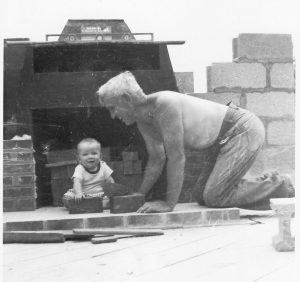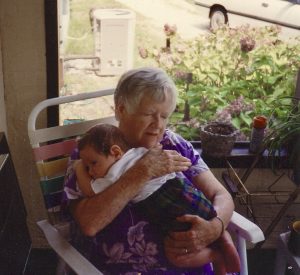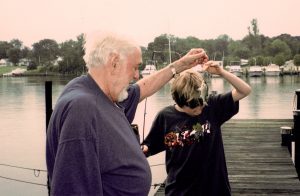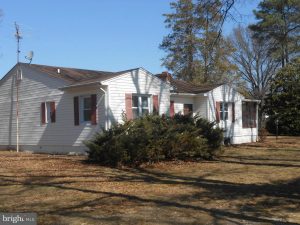You drive south on Maryland Route 235, through Waldorf and Hughesville. A little ways after you pass the Hollywood Volunteer Fire Department, you turn left at the Burchmart gas station. Bear left past the Hole in the Wall Tavern, continue until you pass Snellman’s store, and take the next right. After you go by Greenwell State Park, turn right on Ingleside Road, where there’s a house on the corner. Bear left at the T, pass Smith’s Nursery, and turn into the circular driveway paved with oyster shells.
You’ve arrived at the house my grandparents built to retire to, a modest two-bedroom cinderblock structure painted white. And when I say “built,” I mean that literally. There are photos of my dad carrying lumber over his head in a classic strongman pose, and of infant me sitting in what would be the living room while my grandfather laid bricks for the hearth. They’d bought the land from the farmer who lived next door, who still grew corn and soybeans in a field across the road. The property backed up on a body of water called a “creek” in those parts even though it’s 500 feet wide.
Helping my grandfather lay bricks for the fireplace.
By the time they moved in, they’d built a pier on the water and a set of concrete steps leading down to it. They would live in that house throughout my chilhood and teen years. We’d go—my parents, sister, and I—”down the country” to visit them regularly from our home outside D.C. We would catch crabs off the pier, swim in the shallow water, go out fishing in their boat. My sister and I would pick blackberries along the road and bring them back for my grandmother to make pies. In the warm evenings we’d all sit on the screened-in porch and watch the lightning bugs flit among the trees.
In those days the area was still mostly farms and woods. My grandfather liked to have friends and relatives come by for crab feasts or oyster roasts, depending on the season. During one of these, the other kids and I walked the half mile down the road to the T and made our way back through the woods. Nowadays those woods are filled with fancy vacation and retirees’ homes, but at the time—with the exception of Smith’s Nursery—there were just shacks and bungalows. We couldn’t get lost, with the road on one side and the water on the other, but we felt like Daniel Boone blazing a trail through the wilderness.
My turn
My grandmother died in 1974 while I was living in Massachusetts, and I flew home for the funeral. My grandfather died in 1976 while I was living in Los Angeles, which was too far to go back from. But not long after, my mother called to tell me that she and my dad were planning to expand the house and retire to it themselves, and that it would be a big help to them if I was willing to live in it for a while so it didn’t sit empty. “Are you asking me to come back and live there?” I asked. “It would be a big help to us,” she replied, which I took as a “yes.” (She may have also wanted to retrieve me from an environment where I had been arrested for the first time, but that’s another story.)
I moved into the house in November, just in time for the coldest winter anyone could remember. The creek froze hard enough to walk all the way across, something we’d never seen in all the time my grandparents lived there. The ice stuck to the pilings of the pier and the tides pulled them up and down, so by spring everyone’s piers were at crazy Dr. Seuss angles. The magnolia tree was shocked into submission; the existing branches never put out leaves and flowers again, though years later new shoots started growing from the trunk. I lived on Stouffer’s pot pies and miso soup with seaweed and accustomed myself to an environment where watching the trees leaf out once spring came was the height of entertainment. I even dug up the yard with shovel and pickaxe (learning why they call it “backbreaking work”) and planted a garden.
A couple of Mormon missionaries knocked on the door one day with their books and flip charts. I invited them in—I didn’t know anything about Mormonism and was starved for company. (I was in the habit of driving almost 50 miles just to go to a couple of bars and listen to a band.) For their part, they didn’t know anything about popular culture. We soon reached an accommodation: they would come by every week and spend an hour talking to me about Mormonism, and then we’d spend an hour listening to rock music and playing chess.
By that summer, I had grown tired of living so close to my parents, so when a couple of friends called me from Nantucket and told me they had a place for me to stay, I accepted the suggestion.
Next up
By that time, my father was ready to retire from his government job, and my mother had stopped teaching a few years before. They added a second, more formal living room and a dining room to the house and moved in themselves. Thus began the house’s next chapter.
I continued to visit regularly, taking the train down from New York, where I’d landed. But soon I moved to California again, to San Francisco this time, with the woman I would eventually marry. We kept going back once or twice a year—every Christmas at first, but eventually at other times after we got tired of only seeing the East Coast in the dead of winter. There still wasn’t a lot to do, and my mother’s declining health kept her mostly tethered to the house. On one trip, though, I arranged for us all to drive to Ocean City, MD, a place we used to go on family vacations when I was a kid. It was probably the last major trip my mother took.
Eventually, my son was born. As soon as it was feasible, we took him back to meet his grandparents (and for our parents to meet their grandson). I have a treasured photo of my mom holding my baby son on that same screened-in porch, with a look of deep satisfaction, wonder, and love on her face.
Mom gets to know her grandson
Not long after that, my marriage fell apart. I retained custody of my son, and we continued to visit the house every summer. Life at the house stayed pretty much the same, with a good portion of the conversation revolving around what we were going to have for dinner that night. I would sometimes employ my Calfornia-honed cooking skills to make something novel, like the time I made grilled vegetables with herbs and balsamic vinegar.
I also got to watch my son enjoy the same activities I had as a child—sitting on the porch watching lightning bugs, catching fish off the pier, using the riding lawnmower—with the addition of nightly Bingo games with prizes found by my sister at the dollar store. One summer he and I lay on our backs on the pier and watched a meteor shower light up the dark country sky.
My mom died when my son was 6. After the funeral, we had a reception in the house, attended by a lot of people I didn’t know. It was probably the biggest social event that second living room had ever seen.
The house’s only occupant after that was my dad, but that didn’t interrupt the yearly visits. He would argue with my son about who got to sit in the recliner in front of the TV, and he’d bait the hooks for my son to fish with.
Grandad teaches grandson to fish.
And then, when my son was 14, my dad died. He’d managed to stay in the house until the final weeks, when a sudden decline put him in the hospital. My sister and I started to have the discussions about whether it was time for him to move to an assisted living situation, but he never made it that far.
Final chapter
Now the house belonged to my sister and me. I still lived in San Francisco, while she still lived outside D.C. That meant it fell to her to manage the next steps, for which I am forever grateful. She cleaned out the house, retrieved the items we wanted to keep (including my grandmother’s rocking chair, which sits in her basement waiting for me to have it shipped out), and organized the estate sale. She also got the floors refinished, the kitchen appliances upgraded, and the walls painted.
But none of that answered the question of what to do with it. My sister had more mixed feelings about the place than me—for her it was associated with caring for my mother in her final years. And she told me that my mother once advised her to, after she and my father were gone, “take the money and run.” For me, the place had more of a rosy glow generated by my own nostalgia and idealized memory. I also thought a lot about how my son was the fourth generation to enjoy the pleasures of “down the country.”
We made some effort to rent it, but all the prospective renters fell through. Meanwhile, we were paying to have the yard mowed and the heater supplied with oil and holding our breaths every time there was a major storm. Finally, a few years after my father died, we acknowledged to each other that neither of us planned to ever live there, at the end of that country road in the cultural backwater of Southern Maryland. And neither of us was in a position to keep it empty as a vacation home.
We finally put the house on the market six years after my father died. Our agents fixed the place up even more, tearing out walls and cutting down trees to the point the property was nearly unrecognizable.
Redfin’s version of the house.
We’re not sure they got us the best price possible—we suspect they might have had an “arrangement” with the buyers—but neither one of us was in a position to monitor the showings and the offers. The sale closed in 2015, and it wasn’t our house any more.
I’ve been back once since then to say goodbye, parking on the road nearby to just look at the house and indulge my nostalgia. I drove away feeling like I did at my mother’s wake: it looked like the house I knew, but the spirit was gone. I still spend time with the old photos when I run into them on Facebook, and the end of the pier is still one of the places I choose when someone tells me to imagine myself in a “happy place.”




